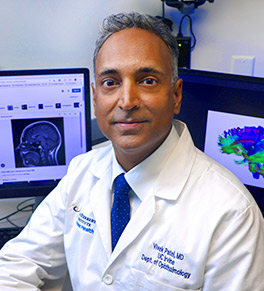Eyes are a window into the brain

At 20 weeks pregnant, a woman arrived at the UCI Medical Center emergency department experiencing sudden blindness in one eye and rapidly deteriorating vision in the other.
Emergency specialists immediately brought in neurologists and ophthalmologists to help find the source of the problem and give her the best treatment.
“Time is vision,” explains Dr. Vivek Patel, chief of neuro-ophthalmology services for the UCI Health Gavin Herbert Eye institute. “Every day that the cause of a vision problem like this goes untreated, there’s potential for permanent damage.”
Brain and vision
It is said that the eyes are the window to the soul, but they may more accurately be described as the window into the brain. Our eyes often provide clues about what’s going on deep inside our heads — from changes in blood flow to muscle control.
UCI Health neuro-ophthalmologists work closely with their neurosurgery colleagues to treat patients with complex conditions that affect vision, such as multiple sclerosis, brain tumors, double vision, traumatic brain injuries, Parkinson’s disease and other movement disorders.
“The retina and optic nerve can give us a lot of information about what’s going on in the brain,” says UCI Health neurologist Dr. Claire Henchcliffe, who specializes in Parkinson’s disease. “As neurologists, we may have a suspicion of what the diagnosis is, but the eyes are what clinch it for us. We really need to confer with our eye experts.”
For example, one condition easily mistaken for early Parkinson’s disease can be accurately identified by a neuro-ophthalmologist examining the eye for tiny movements, the telltale sign that it instead is progressive supranuclear palsy. Making the right diagnosis early on helps get a patient started on the best course of treatment as soon as possible..
Enhancing patient care
Patel is working to develop more formal collaborations between UCI Health neurologists and neuro-ophthalmologists to further enhance patient care.
These include creating a network of multidisciplinary specialists to treat traumatic brain injuries, which often affects sight. Other specialists will collaborate to better serve patients with ataxia who are experiencing balance issues as well as vision problems.
Patients with multiple sclerosis and other neurologic autoimmune conditions that can damage vision soon will be able to see a neuro-immunologist and a neuro-ophthalmologist during the same visit.
“As a young and growing department, there’s energy and enthusiasm to activate new services like these,” says Dr. Samuel J. Spiegel, who is the newest addition to the neuro-ophthalmology team, which includes Patel, Dr. R. Wade Crow and Dr. Lilangi Ediriwickrema.
“In our academic medical system, we share patients, refer within our network and meet periodically to discuss our patient cases so that every individual gets the highest standard of care, even for the most complex diseases,” Spiegel adds.
Looking ahead
Current patients aren't the only ones who benefit from the eye institute’s neuro-ophthalmologists.
“These guys are awesome teachers,” says Henchcliffe, professor and chair of the UCI School of Medicine's Department of Neurology. “When we train neurologists, they need to understand a certain amount of neuro-ophthalmology. We’re fortunate that Dr. Patel and Dr. Spiegel are very involved with teaching our residents and even their peers.”
The medical school's Department of Ophthalmology also recently launched a neuro-ophthalmology fellowship, offering advanced training to doctors who want to specialize in the field.
Henchcliffe, who closely watches the eye institute's research findings, is especially excited about neuro-ophthalmology research that may lead to better imaging techniques and identifying new biomarkers for neurological diseases.
“We pride ourselves on providing superior clinical care, but we need to improve the options available to patients, and that’s where we need more research,” she says. “As neurologists, we pay attention to the research in ophthalmology, because where they lead, we can follow.”
Restoring sight
When Patel saw the pregnant woman who was losing her sight, he ordered tests to identify the source of inflammation that was affecting her vision. He also coordinated with neurologists to give her intravenous immunoglobulin (IVIG) to tamp down the inflammation. Within a matter of days, her vision was restored.
“She needed the highest order of care from a team working together across multiple areas of expertise,” says Patel. “That can be more difficult to get in an outpatient setting, but it is exactly what an academic medical system like UCI Health can provide."
“As neuro-ophthalmologists, we collaborate with neurologists and neuro-immunologists every day,” he adds. “In this case, we worked together to take her from blindness to seeing.”
Learn more about the Gavin Herbert Eye Institute and its vision services ›
Related stories
- Stem cell transplant restores vision ›
- A sister's gift restores sight ›
- Dietary supplements to fight macular degeneration ›





